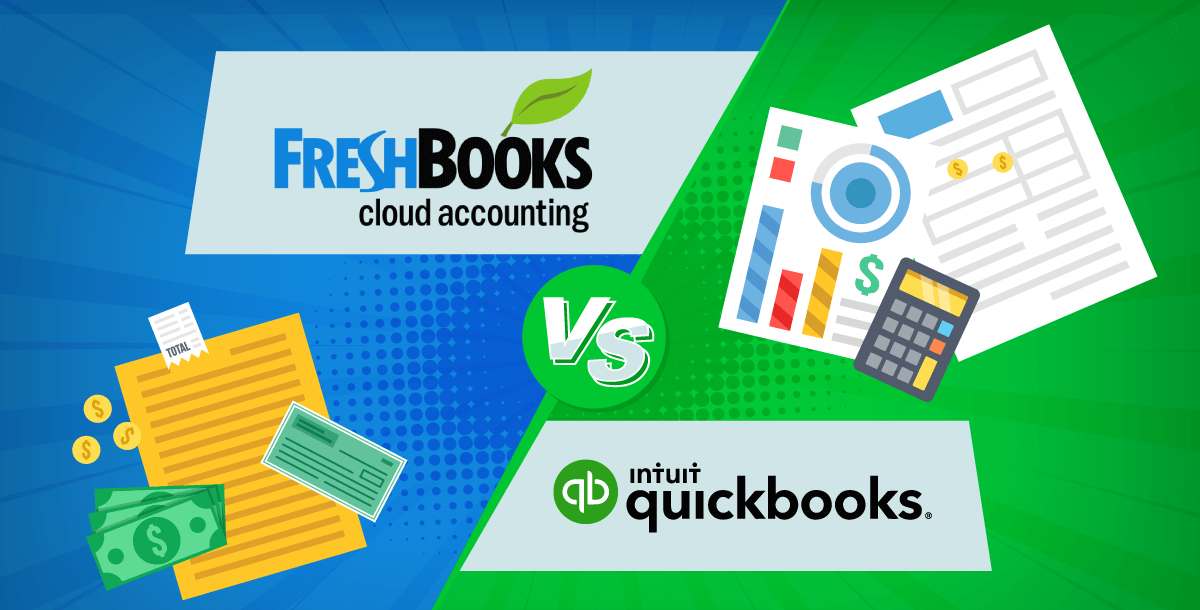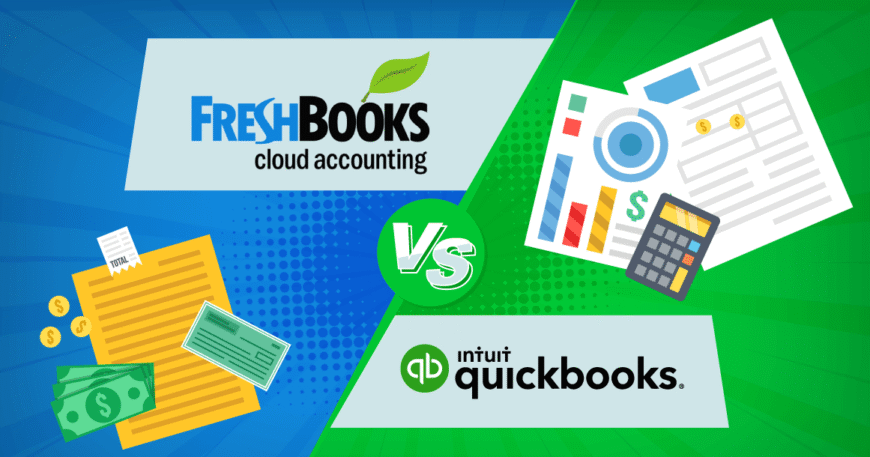FreshBooks vs QuickBooks: Which Is Better for Your Business?
In today’s digital world, choosing the right accounting software is crucial for the success and smooth operation of your business. With so many options available, business owners often find themselves torn between two of the most popular solutions: FreshBook and QuickBooks. These platforms offer distinct features, functionalities, and pricing models that cater to different business needs. If you’re unsure whether FreshBooks vs QuickBooks is the right comparison for your business, this detailed guide will help you make an informed decision.
In this blog post, we’ll explore everything you need to know about FreshBook vs QuickBooks, including their features, pros, cons, ease of use, and pricing. By the end, you’ll have a better understanding of which platform is best suited for your business.

What is FreshBooks?
FreshBooks is a cloud-based accounting software primarily designed for small business owners, freelancers, and service-based businesses. It simplifies the accounting process by focusing on invoicing, expense tracking, and financial reporting. FreshBook is known for its user-friendly interface, making it a popular choice for those who may not have accounting expertise but need a reliable way to manage their finances.
Some of FreshBooks’ key features include:
-
Customizable Invoices: FreshBooks allows users to create professional-looking invoices that can be customized with branding, payment terms, and more.
-
Time Tracking: Perfect for freelancers, FreshBook enables users to track billable hours and link them directly to invoices.
-
Expense Management: The software automatically tracks expenses and generates reports, making it easier for users to stay on top of their finances.
-
Client Portal: FreshBook offers clients a portal where they can view invoices, make payments, and communicate with the business owner.
FreshBook has gained a reputation for being easy to use and suited for businesses that need basic accounting tools without the complexity of larger solutions.
What is QuickBooks?
QuickBooks, developed by Intuit, is one of the most widely used accounting software solutions for small and medium-sized businesses. Unlike FreshBooks, which is mainly focused on invoicing and time tracking, QuickBooks offers a broader range of features that cater to more complex accounting needs. QuickBooks is highly scalable and can be used by businesses of various sizes, including those with larger operations.
Key features of QuickBooks include:
-
Comprehensive Bookkeeping: QuickBooks provides tools for tracking income, expenses, bank reconciliation, payroll, and more. It’s designed to give businesses a complete overview of their financial health.
-
Customizable Invoicing: Like FreshBooks, QuickBooks allows for professional invoicing. However, it also includes advanced features such as recurring invoices and payment reminders.
-
Advanced Reporting: QuickBooks offers a wide range of reports, including profit and loss statements, balance sheets, and tax reports. These reports are useful for both day-to-day decision-making and year-end tax preparation.
-
Payroll Integration: QuickBooks offers payroll solutions, making it easy for businesses to manage employee salaries, tax withholdings, and benefits.
QuickBooks is a great solution for businesses that need a robust accounting tool with advanced functionality.
FreshBooks vs QuickBooks: Key Differences
Now that we’ve covered an overview of both FreshBook and QuickBooks, let’s dive into the key differences between the two platforms.
1. Ease of Use
-
FreshBooks: FreshBook is known for its simple, intuitive interface. The platform is designed with small business owners and freelancers in mind, making it easy to navigate and perform basic accounting tasks such as invoicing, expense tracking, and time management. Even if you have no accounting experience, FreshBook’ user-friendly design allows you to get started quickly without the need for training.
-
QuickBooks: QuickBooks, while powerful, has a steeper learning curve. The platform offers a wider range of features, which can be overwhelming for new users or those without accounting experience. While the interface is relatively straightforward, users may need more time to fully grasp its capabilities, especially if they want to take advantage of its advanced tools such as reporting and payroll.
2. Features
-
FreshBooks: FreshBooks offers core features such as invoicing, time tracking, expense management, and client communication. It is ideal for service-based businesses, freelancers, and small businesses that require straightforward accounting tools. While FreshBook excels in simplicity, it lacks some of the more advanced features offered by QuickBooks, such as full-fledged inventory management and detailed financial reporting.
-
QuickBooks: QuickBooks is a feature-rich platform that offers everything FreshBook does and more. It includes advanced bookkeeping tools, payroll management, detailed financial reporting, and more. QuickBooks is suited for businesses that require comprehensive accounting solutions with robust customization options and scalability.
3. Pricing
-
FreshBooks: FreshBooks operates on a subscription-based pricing model, with several plans to choose from. Its pricing is generally more affordable for smaller businesses and freelancers. The lowest tier starts at an affordable monthly fee, with the cost increasing as your business grows and requires additional features such as more clients and team members.
-
QuickBooks: QuickBooks also operates on a subscription basis but can be more expensive than FreshBook. The price of QuickBooks varies depending on the plan and the size of your business. However, it is often considered a more cost-effective solution for growing businesses that need the additional features offered by QuickBooks.
4. Customer Support
-
FreshBooks: FreshBooks is known for offering excellent customer support. Whether you need help with invoicing, billing, or taxes, FreshBook provides quick responses via email, chat, and phone. Their support team is well-versed in the platform’s features and is ready to assist with any issues you may encounter.
-
QuickBooks: QuickBooks offers customer support via phone, chat, and community forums. However, some users have reported that QuickBooks’ support can be slow at times, especially for more complex issues. That said, QuickBooks offers extensive help documentation and tutorials that can help users resolve common problems on their own.
5. Scalability
-
FreshBooks: FreshBooks is a great choice for freelancers and small businesses but may not be the best solution for growing companies with complex accounting needs. As your business expands, you may find that you need more features, such as payroll processing and inventory management, that FreshBook does not offer.
-
QuickBooks: QuickBooks shines when it comes to scalability. It is designed to grow with your business, offering more advanced features and customization options as your needs evolve. QuickBooks is a solid choice for medium-sized and larger businesses, as it can handle everything from basic accounting to payroll and inventory management.
FreshBooks vs QuickBooks: Pros and Cons
FreshBook Pros:
-
Simple and user-friendly interface
-
Great for freelancers and small businesses
-
Customizable invoices and easy time tracking
-
Affordable pricing
-
Excellent customer support
FreshBook Cons:
-
Limited features compared to QuickBooks
-
Lack of advanced reporting tools
-
Not ideal for larger businesses with complex accounting needs
QuickBooks Pros:
-
Feature-rich with a wide range of accounting tools
-
Advanced reporting options and customizable features
-
Scalable for growing businesses
-
Includes payroll and tax management tools
-
Comprehensive customer support options
QuickBooks Cons:
-
Steeper learning curve
-
More expensive than FreshBook
-
Can be overwhelming for small businesses or freelancers
Which is Better for Your Business?
The decision between FreshBook vs QuickBooks ultimately depends on your business size, accounting needs, and budget. If you are a freelancer or small business owner with basic accounting needs, FreshBook may be the better option due to its simplicity, ease of use, and affordable pricing. On the other hand, if you are running a growing business that requires more advanced features such as payroll management, inventory tracking, and detailed financial reporting, QuickBooks is likely the more suitable choice.
Final Thoughts
Choosing the right accounting software for your business is an important decision. Both FreshBook vs QuickBooks offer valuable features, but the best choice depends on your specific business requirements. We hope this comparison has provided you with the information you need to make an informed decision.
At Syed Professional Services, we specialize in helping businesses with tax, accounting, and immigration services. Whether you’re managing finances or navigating complex tax regulations, we’re here to help you every step of the way. Contact us today to learn more about how we can support your business.
Call to Action:
Need expert advice on choosing the right accounting software for your business? Contact Syed Professional Services today and let us help you optimize your accounting systems.



